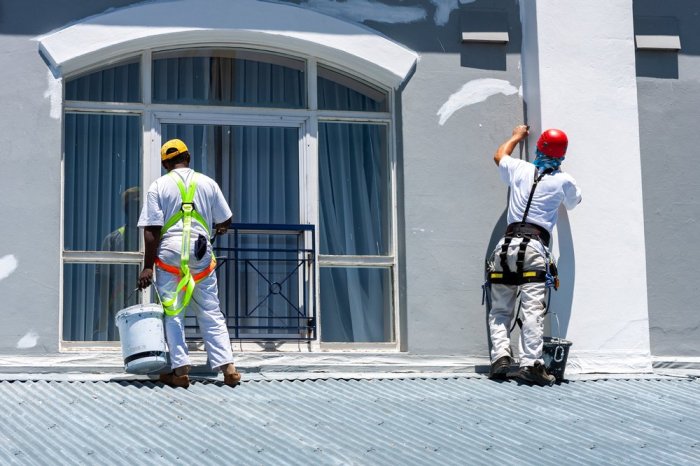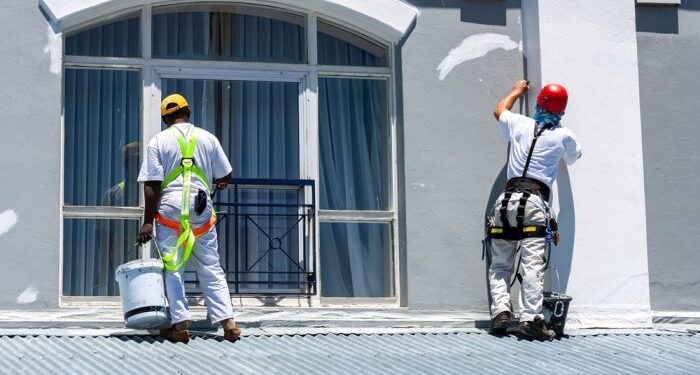With commercial painting contractors playing a crucial role in the construction industry, it's essential to understand their significance and impact. From transforming dull spaces to enhancing brand image, these professionals bring life to commercial projects. Let's delve into the world of commercial painting contractors and uncover what makes them indispensable.
In the following sections, we will explore the qualities to look for in commercial painting contractors, the types of projects they handle, the tools and techniques they use, and much more.
Overview of Commercial Painting Contractors
Commercial painting contractors play a crucial role in the construction industry by providing professional painting services for commercial projects. These contractors are experts in painting large-scale properties such as office buildings, retail spaces, and industrial facilities.
Importance of Hiring Professional Commercial Painting Contractors
Professional commercial painting contractors bring a wealth of expertise and experience to commercial projects. They ensure high-quality workmanship, use durable materials, and adhere to safety regulations, delivering a finished product that meets the client's expectations.
- Expertise: Commercial painting contractors have the skills and knowledge to handle complex projects efficiently and effectively.
- Quality Workmanship: Professionals ensure that the painting job is done with precision and attention to detail, resulting in a visually appealing finish.
- Use of Durable Materials: Commercial painters use high-quality paints and coatings that withstand heavy foot traffic, harsh weather conditions, and other challenges faced by commercial properties.
- Safety Compliance: Professional contractors follow safety protocols to protect both their workers and the occupants of the commercial building during the painting process.
Typical Services Offered by Commercial Painting Contractors
Commercial painting contractors offer a range of services tailored to meet the specific needs of commercial clients. These services may include:
- Interior Painting: Painting walls, ceilings, and other interior surfaces of commercial buildings.
- Exterior Painting: Painting the exterior walls, facades, and other exterior surfaces of commercial properties.
- Surface Preparation: Preparing surfaces by cleaning, sanding, and priming before applying paint.
- Color Consultation: Providing guidance on color selection and schemes to enhance the aesthetics of the commercial space.
- Special Coatings: Applying specialized coatings such as epoxy, anti-graffiti, or fire-retardant coatings for added protection.
Qualities to Look for in Commercial Painting Contractors
When choosing a commercial painting contractor for your project, it's essential to consider several key qualities that distinguish reputable professionals from others. Certifications, experience, reliability, and reputation play a crucial role in ensuring a successful outcome for your painting project.
Certifications and Experience
Certifications and experience are vital factors to consider when selecting a commercial painting contractor. Look for contractors who are licensed and insured, as this demonstrates their commitment to quality work and adherence to industry standards. Additionally, experienced contractors bring valuable knowledge and expertise to the table, ensuring that your project is completed efficiently and to the highest standards.
Reliability and Reputation
Assessing the reliability and reputation of commercial painting contractors is crucial in making an informed decision. Seek out contractors with a proven track record of delivering projects on time and within budget. Reading reviews and testimonials from past clients can provide insight into the contractor's reliability and reputation.
Additionally, don't hesitate to ask for references and follow up with them to gauge the contractor's performance and professionalism.
Types of Commercial Painting Projects
Commercial painting contractors take on a variety of projects in different industries, each with its own unique challenges and considerations. Let's explore some examples of different types of commercial painting projects and how contractors adapt their services to meet the specific requirements.
Office Buildings
Commercial painting contractors often work on office buildings, which require a professional and clean appearance. They may need to work around office hours to minimize disruption and use high-quality paint that is durable and long-lasting.
Retail Stores
Painting projects in retail stores involve creating an inviting and attractive environment for customers
Hotels and Hospitality
Hotels and hospitality venues often require painting services to maintain a fresh and welcoming atmosphere for guests. Contractors must use high-quality paint that can withstand frequent cleaning and adapt to the specific design requirements of each space.
Industrial Facilities
Industrial facilities have unique painting needs due to the presence of heavy machinery, chemicals, and high humidity levels. Contractors must use specialized coatings that can withstand harsh conditions and adhere to safety regulations.
Healthcare Facilities
Painting projects in healthcare facilities must meet strict cleanliness and hygiene standards. Contractors need to use paint that is mold-resistant, easy to clean, and complies with health codes to ensure a safe environment for patients and staff.
Tools and Techniques Used by Commercial Painting Contractors

Commercial painting contractors rely on a variety of tools and techniques to ensure that their projects are completed efficiently and with high-quality results. These professionals are equipped with specialized equipment and trained in specific techniques to tackle a wide range of commercial painting projects.
Tools and Equipment
- Paint Sprayers: Commercial painters often use paint sprayers to apply paint quickly and evenly across large surfaces, such as walls or ceilings.
- Rollers and Brushes: Traditional tools like rollers and brushes are still essential for precision work and detail-oriented projects.
- Sanding Tools: Sanding tools are used to prepare surfaces before painting, ensuring a smooth and even finish.
- Ladders and Scaffolding: Commercial painting contractors rely on ladders and scaffolding to reach high or difficult-to-access areas safely.
- Protective Gear: Safety equipment like masks, goggles, and gloves are crucial for protecting painters from potentially harmful fumes or materials.
Techniques
- Surface Preparation: Professional painters know that proper surface preparation is key to a successful paint job. This includes cleaning, sanding, and priming surfaces before applying paint.
- Cutting In: To achieve clean lines and edges, painters use a technique called cutting in, which involves carefully painting along edges and corners with a brush before using a roller.
- Layering: Layering paint coats allows for better coverage, durability, and color consistency, ensuring a professional finish.
- Spraying Techniques: Paint sprayers offer a fast and efficient way to cover large areas quickly, but painters must master proper spraying techniques to avoid overspray and achieve even coverage.
Impact of Technology
Advancements in technology have revolutionized the tools and techniques used by commercial painting contractors. The introduction of digital color matching tools, spray technologies, and protective coatings has improved efficiency, accuracy, and safety in the painting industry. These innovations allow painters to work faster, more precisely, and with better results than ever before.
Conclusion
As we conclude our exploration of commercial painting contractors, it's evident that their expertise goes beyond just paint and brush. Their attention to detail, quality workmanship, and ability to adapt to diverse project requirements make them invaluable partners in any commercial endeavor.
Whether it's a small office renovation or a large-scale construction project, commercial painting contractors are the unsung heroes who add the final touch of perfection.
FAQ Explained
What distinguishes reputable commercial painting contractors?
Reputable commercial painting contractors have certifications, extensive experience, a proven track record of quality work, and positive client testimonials.
How do commercial painting contractors adapt to project requirements?
Commercial painting contractors tailor their services based on the specific needs of each project, adjusting techniques, materials, and timelines accordingly.
What tools are commonly used by commercial painting contractors?
Common tools include paint sprayers, brushes, rollers, sanders, ladders, and protective gear to ensure safety and efficiency.










